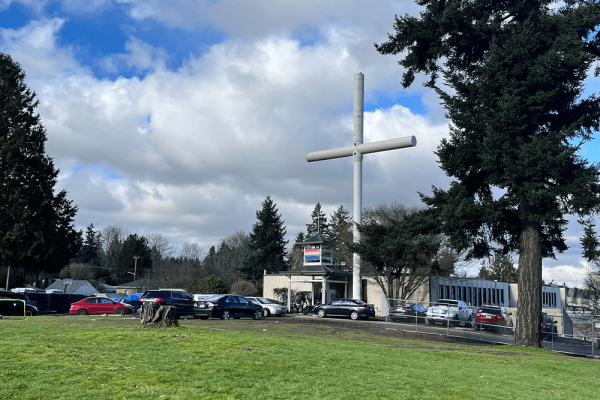For more than a year, Riverton Park United Methodist Church in Tukwila, Wash., has been a cramped, uncomfortable shelter for hundreds of refugees. Neither designed nor intended to be a camp for those navigating the complicated immigration and asylum process, the ongoing situation has become a crisis, with the city declaring a state of emergency last October. Still, as Riverton Park remains unwilling to turn people away, the church and its neighbors, community organizers, and local government are all seeking solutions to the crisis.
In December 2022, the first South American and African refugees began arriving. The church does not have the capacity or resources to fully support this many refugees at once. No one is quite sure why so many refugees have sought out Riverton Park, but some came from as far as San Antonio, after saying a shelter told them the church would provide support. Over periods of the last year, the church has hosted anywhere between 200 and 500 people.
Rev. Jan Bolerjack, the lead pastor at the church, said that despite the strain it has placed on the church, they continue to welcome people who have nowhere else to go, referencing the Christmas story of Joseph and Mary struggling to find lodging in Bethlehem.
“I believe we [should] see the divinity in one another and treat one another with kindness and equity. I couldn’t see [us] turning people away at the door,” Bolerjack told Sojourners. “To me, it’s just part of who we are: We open the door, welcome the stranger, feed the hungry, clothe the naked, free the oppressed.”
As the church struggles to meet the need in front of it, Bolerjack said Riverton Park feels like they are in a holding pattern as they await government aid. Riverton Park’s shelter, according to Bolerjack, is financially supported by grants and philanthropic donations. The church has been “barely making ends meet” with the money they have secured.
At the end of 2023, the church had received $500,000 in donations for supporting refugees and spent over $300,000 on supplies, utilities, staffing, case management, legal assistance, and paying for some refugees to stay in local hotels.
“I’d say we’ve been running in crisis mode for over a year now,” Bolerjack said. “This was not meant to be a long-term, organized response. We’re doing our best to respond with limited resources, staff, and space.”
Unmet expectations
Some refugees like Felipe, who fled political persecution in Venezuela and asked Sojourners to use only his first name because of his legal status, expressed their frustration at unmet expectations of support.
Felipe, an electrical engineer, has been at the church less than a month, but through an interpreter, he told Sojourners: “You only need to be here for three days to really see what’s going on.”
People staying at the church told Sojourners that it’s been incredibly difficult to secure work permits through the federal government — a process that typically takes between six months to a year but can take even longer.
John and Jaqueline are a married couple from Angola currently living at Riverton Park, who requested only their first names be used due to their sensitive legal status. Through an interpreter, John and Jaqueline said they came to the U.S. looking for a good life and to escape political discrimination. John, an architect by trade, said that having to wait for a work permit has been difficult.
“I’m itching to work,” he said. “We left kids in Africa. It’s really difficult because we need to send money back.”
Juan Carlos, who asked that only his first name be used, told Sojourners through an interpreter that he fled Venezuela after being threatened by Venezuela’s Special Action Forces (FAES), a squadron of the Venezuelan national police that the United Nations has accused of carrying out extrajudicial killings in the country.
Felipe and Juan Carlos each said they left their families behind when coming to Riverton Park.
Both men said they were eager to work and that ascertaining work permits was the only thing stopping them. Every Monday, volunteer paralegals and attorneys come to Riverton Park to help those sheltering at the church apply for work permits. Despite these efforts, the process can still feel confusing and disorganized for those sheltering at the church.
Government involvement
Tukwila has a population of around 21,000 according to the U.S. Census Bureau’s most recent estimate. In October 2023, the mayor of Tukwila declared a state of emergency, calling on King County, the state, and the federal government to lend support.
Brad Harwood, communications consultant for the city of Tukwila, told Sojourners in an email that the local municipality has been working with Riverton Park since the spring of 2023. The city has not provided direct funds to the church for assisting with the encampment, but they have provided other resources: staff for site management, garbage removal, a fence around the encampment, food storage, a police presence, and more.
Harwood told Sojourners that the people living at the encampment “deserve better.”
“It’s also important to recognize Riverton Park’s work and compassion in helping to support these asylees,” Harwood wrote. “This is a complex, ongoing issue with no easy solution.”
Harwood explained that Tukwila continues to focus on building a coalition in the King County region, the larger county where Tukwila and other Seattle-area cities are located. Tukwila is also aiming to partner with other cities, agencies, and stakeholders in hopes of finding “short, mid and long-term plans” that directly assist the refugees at Riverton Park. He added that there is an urgent need for something to be done, “especially at the state and federal level.”
Washington Gov. Jay Inslee has not directly commented on the situation. But in February, Mike Faulk, a spokesperson for Inslee’s office, told the Washington State Standard that Inslee is working on a supplemental budget proposal that includes an additional $5 million for the Office of Refugee and Immigrant Assistance. Inslee has also proposed an additional $3 million be put toward a grant program dedicated to helping counties support refugees. If approved by the Washington Legislature, new funds wouldn’t be available until the summer.
Bolerjack told Sojourners that King County recently asked a steering committee comprised of several local nonprofits to work on a proposal for $1 million in relief, which would be put toward assisting the refugees. If the proposal is approved, the church will receive and disperse the funds. King County officials did not immediately respond to a request for comment.
Community organizing
Christina Goto is a Seattle-based organizer who works with Super Familia, a mutual aid group dedicated to assisting unaccompanied and undocumented youth, and South King County Mutual Aid. Super Familia has been active in the Seattle area, advocating for housing for refugees. In January, Goto and other organizers accompanied a group of refugees who marched on Seattle City Hall to request aid from Seattle councilmembers.
Goto wants local organizers to be able to work with the church and support them, but there have been tensions and conflicts in their past attempts. Rosario Lopez, who is a Seattle-based, undocumented organizer working with Super Familia and South King County Mutual Aid, told Sojourners they and others were passing out water bottles last December when Bolerjack accused Lopez and others of selling drugs and asked them to leave. Both Goto and Lopez said that this was an example of racism and discouraged them from working with the church.
Bolerjack told Sojourners that there were several instances of people being asked to leave the church property for various reasons, and she didn’t remember this encounter. Riverton, she said, is trying to protect refugees, a vulnerable population. But Bolerjack acknowledged how the request to leave might have seemed racist.
“I totally understand. Especially as a white woman asking someone, a person of color, to not offer their services because I don’t know what they’re offering. Of course,” she said.
Goto said community organizers might be willing to work with Riverton if the church intentionally communicates with organizers and tells organizers how much money the church is receiving from donations for refugee care. Local organizers want to do more to provide support, Goto said. “We just need to establish those communication channels.”
Ken Nsimbi, an advocate for refugees who lives near the church and has been volunteering at Riverton Park since last summer, told Sojourners he hopes for better communication between the church and community organizers. He is also pushing other churches throughout the Seattle region to be more involved.
Nsimbi told Sojourners that he’d like to see Christians who are culturally sensitive, multilingual, and aware of global issues volunteer to host refugees in their own homes.
“The Lord tells us to reach out to the ‘least of these,’” he said of his involvement. “I couldn’t keep driving by and not do something.”
Got something to say about what you're reading? We value your feedback!







